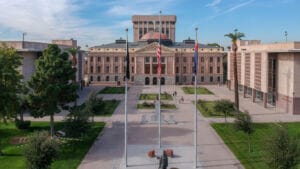Q: How will the state tax incentives and tax cuts in the recently passed “Jobs Bill” make our State more competitive?
CW: Incentives have been a way of life in economic development for 40 years. The use of Industrial Revenue Bonds in the Southeast started in Mississippi back in the 1970s and Kentucky’s win of Toyota’s first U.S. manufacturing facility in 1984 using a combination of state and local incentives opened the door to what is now a common practice throughout the U.S. The recently passed “Jobs Bill” is a giant step forward for Arizona on being able to compete on a national and in some cases, an international level for new investment.
Some components, such as the Governor’s Fund, are a start, but when you compare our $25M fund to the initial funding of Texas’ Enterprise Fund at $295M, you get the idea how level the playing field is out there. The real value to making Arizona competitive was in the areas of commercial property taxes decreasing, tax exemptions increasing for business equipment and job-creation tax incentives replacing Arizona’s enterprise zone program.
Companies evaluating new locations are not looking for reasons to come to a community but are looking for reasons to eliminate locations from the site location process. This legislation just makes us competitive, but does not make us the clear-cut choice. There is still much we still have to do to obtain that goal.
DW: Hats off to the Legislature and the governor for making Arizona more competitive. Arizona’s leaders sent a clear message to business in our state looking to expand and those companies both national and international looking to create new opportunities in Arizona. By Arizona reducing the overall tax burden on business those dollars drop straight to the bottom line allowing business to redeploy those dollars in human capital, research and development and technology.
Q: Is the furor over immigration policies still creating an image problem for the state?
CW: Yes. I was recently in Georgia where they enacted legislation that was referred to in the local press as “Arizona’s SB 1070 on steroids.” Arizona is still considered the “birthplace” for this type of legislation. Having said that, I do think it is not as big of an issue as it was last year when Gov. Brewer signed it into law. During the recent MLB All-Star Game, the issue was not much more than a side bar story. What creates an image problem for Arizona is when something happens that gives cause to putting the state in the national spotlight.
The most recent issue involved a handgun incident at the Legislature. My point is that Arizona’s image problem is not limited to just one issue or incident. It’s a puzzle and every time we put a new piece in place, it gives cause for Arizona’s image to be re-examined and all the past incidents are in the spotlight again. Is this important? All I can say is when I was trying to relocate industry from Arizona to Georgia, the furor over Martin Luther King Day was an embarrassment to some business owners and it led them to move their businesses out of state.
SB: I think Arizona’s immigration policies have quieted down to some degree, however, with the recall effort for Sen. (Russell) Pearce, it seems the opponents of SB1070 are trying to keep the issues in the forefront to keep giving the state a bad rep to put pressure on repealing the law.
With Alabama and Georgia enacting similar legislation, some of the national attention has died down and I believe these states have validated the Arizona law. I do have out-of-state clients that have asked me to put language in contracts that make sure we handle the immigration law issues because they do not understand it. I do think the law enforcement officials have done a superb job of enforcing the law without the racial profiling aspect that the opponents feared the most.
DW: People have moved on. Positives for the state like the “Jobs Bill” and the MLB All-Star Game have moved the general public beyond the issue.


